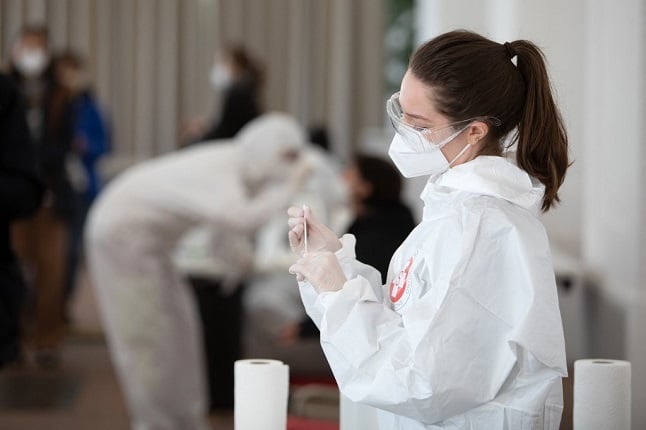Austria this Wednesday recorded 53,071 new cases of coronavirus infections.
There are currently more than 430,000 active cases in the country, meaning that almost half a million people are self-isolating or hospitalised due to the virus.
A number of close contacts, or people who have symptoms, are also considered suspected cases and need to quarantine at home, waiting for the results of a PCR test. And people may also need to stay at home when they are the caretaker of those who are sick.
Health authorities in the alpine country have consistently reiterated that despite rising numbers, the situation in hospitals and intensive care units is not concerning.
Moreover, with the population mostly vaccinated, cases have been less severe.
Currently, 3,266 are hospitalised with the virus, and 227 are treated in intensive care. But the sheer number of new infections, more than 50,000 every day, has started affecting Austrian essential services.
READ ALSO: Covid-19: What to do if you test positive in Austria
Hospital shortages
In hospitals, the effects have brought health institutions to their limits.
In Salzburg state clinics, the situation was exacerbated by many patients needing to receive medical care after ski accidents, Der Standard reported.
Some clinics, including Schwarzach, had decided to postpone planned operations, as 80 of the 1,500 employees were in quarantine. Likewise, Barmherzigen Brüder hospital closed beds due to staff shortages.
In Tirol, the number of sick leave had doubled due to the omicron wave, spokesman Johannes Schwamberger told the daily. He added that many people need to stay at home to care for sick children. The hospital board has started expecting these parents to fall ill a few days later.
READ ALSO: EXPLAINED: Austria’s new Covid-19 testing rules
The same has been happening in Styria, where non-urgent procedures have been postponed due to the lack of staff and other states in Austria. In the capital Vienna, Health Secretary Peter Hacker (SPÖ) said last Friday that 10 percent of the hospital staff were on sick leave, around half of them due to corona.
Public transport and schools also affected
The shortages also have strained services such as public transport throughout Austria.
In Vienna, the city’s public transport operator Wiener Linien this Wednesday announced that the interval for several tram lines would be adjusted to accommodate staff shortages.
Starting Monday, tram lines 1, 5, 10, 33, 37, 42, 44, and 52 would be operating on a limited timetable similar to the holiday plans. There are no estimated dates for the resumption of regular operation.
READ ALSO: EXPLAINED: What are Austria’s current Covid rules?
In Graz, cases of Covid among staff have also led the city line to make changes to the timetables. Starting Thursday, 24, a new schedule, based on holiday times, but with a focus on hospital and school lines, will be adopted.
“This is required due to corona-related staff shortages”, the company that runs public transport in the city, Graz Holding, said.
Schools have also suffered from staff shortages, with many having to improvise, Die Presse reported. For example, a school in Wels, with 30 teachers, saw 10 of them having to stay at home, primarily due to contracting Covid themselves.
Record number of cases
Austria has been reaching record numbers of new cases consistently in the last few weeks, and some measures have already been taken to try and halt the virus.
Last week, the federal government said it would reintroduce mandatory FFP2 masks for indoor areas.
To face the issue of staff shortages, especially in essential sectors such as health care, Health Minister Johannes Rauch (Greens) also said special quarantine rules and regulations were being devised. However, he didn’t give much detail.
READ ALSO: Almost 60,000: Austria hits record daily Covid case total
New regulations are expected to be introduced stating that infected personnel in the health sector may work under certain conditions, though the specific rules would be up to the states.
Useful vocabulary
Personalengpass – personnel shortage
Belastungsgrenze – limit
Gesundheitspersonal – health personnel
Straßenbahnbetrieb – tram operation
Ferienfahrplan – holiday schedule



 Please whitelist us to continue reading.
Please whitelist us to continue reading.
Member comments